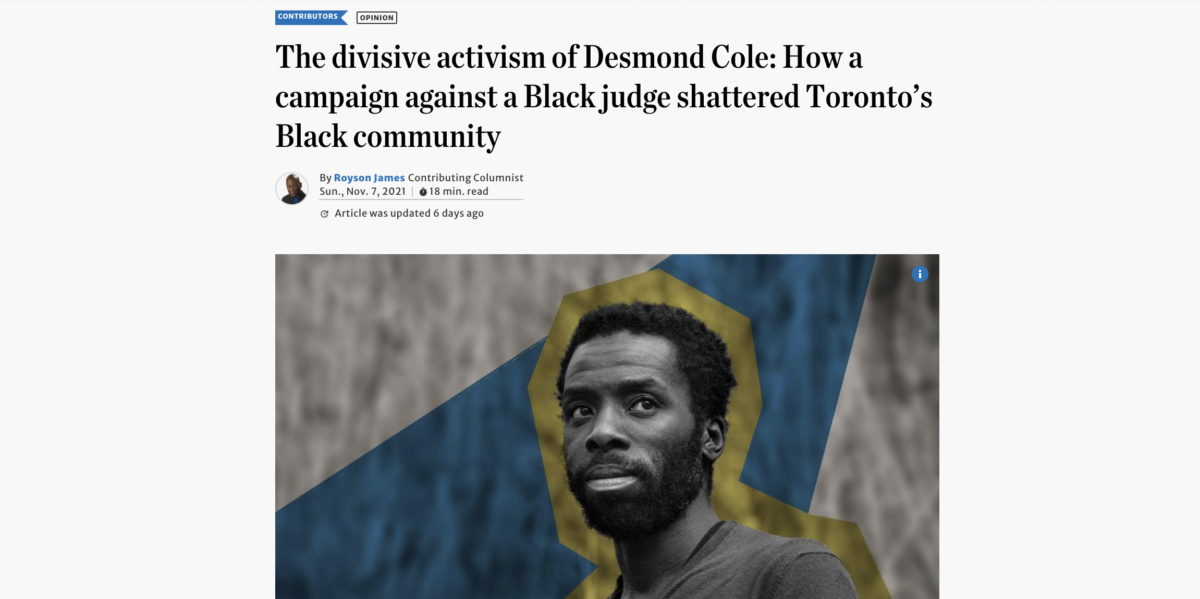On November 7, the Toronto Star published a lengthy opinion piece titled “The divisive activism of Desmond Cole: How a campaign against a Black judge shattered Toronto’s Black community.”
In it, former Star reporter and current contributing columnist Royson James claims to speak for The Black Community — capital T, capital C — when he argues that Cole’s questions and criticisms regarding judge Donald McLeod have brought incalculable grief and anguish to Black people in Ontario and beyond.
In addition to being available online, the piece was published over a highly visible two-page spread in the A section of the printed paper.
James repeatedly stresses that the community is growing increasingly sick of Cole and is distressed and aggrieved by his actions. Curiously, however, the piece does very little to substantiate this claim. Excluding McLeod himself, only four people are quoted in the piece, none of whom mention Cole by name, and one of these quotations is retrieved from a tweet.
More than 440,000 Black people live in the Greater Toronto Area. If James is implying that these four individuals’ opinions represent the view (singular) of The Black Community (monolith), he neglects to argue the point.
James employs the weightiest of words, describing Cole’s political activities as counterproductive, destructive, dispiriting, and dis-unifying, stating that Cole has driven staff and volunteers out of political organizing due to fear of Cole and his supporting “online army,” and accusing Cole of orchestrating a “judicial lynching” against McLeod. Indeed, James arguably goes as far as suggesting that Cole holds specific animosity towards Black people, accusing him of waging “a targeted…assault on [his] own flesh and blood,” and quoting a critic of Cole describing he and those he works with as “vindictive, envious people that just hate the skin they are in.” (An obvious call-back to the title of Cole’s successful and impactful book, The Skin We’re In.)
Despite failing to provide sufficient evidence for the central claim of the piece, James takes every opportunity to highlight the argued breadth of discontent with Cole. By his account, “a growing number of African Canadians” do not like Cole, as it is difficult to do so “if you love Black people;” Cole is “chewed up and spat out” daily among Black people; in response to McLeod’s suspension, “swathes of the Black community were awash in trauma over the general conclusion the McLeod’s blood was on Desmond Cole’s hands.” James provides evidence for none of these, nor for any of the other consensus-declaring statements in the piece.
Much of the rest of the piece is similarly questionable. James contends that Cole engaged in a targeted takedown campaign of McLeod but offers only envy and/or intractable purity politics as motivations. James repeatedly extols the virtues and successes of McLeod and the Federation of Black Canadians, while disparaging Cole and the “radicals” he organizes with. He neglects to consider that the fact he and McLeod are both Seventh-day Adventists, and thus “share the same strictures of this relatively small religious denomination,” may cause him to take criticism of McLeod somewhat personally.
Curiouser still than all this, though, is the fact that Quillette senior editor Jonathan Kay tweeted about the article in advance of its publication, stating that it “says the things that no one is supposed to say” about Cole’s activism. Like James, Kay asserts that the piece expresses how Cole is viewed “by the Toronto Black Community itself.” Kay parroting these remarks gives further cause for doubt, as Quillette — an online magazine launched amid the dim days of the “Intellectual Dark Web” — is noted for publishing articles that arguably entertain race science and aspects of phrenology by way of evolutionary psychology. Kay, a longtime columnist on the political right, spends much of his time talking about all of the people that he doesn’t like, and why. He appears to have learned it from his mother.
James and those he quotes have every right to disagree with Cole’s political activities. If they wish or feel compelled to dislike him based on their experiences, they have that right as well. Indeed, they can even argue that other people should feel discontent toward Cole as they do. However, to repeatedly suggest, without evidence, that contempt toward Cole is a majority and increasing perspective among Black people in and around Toronto is a choice that is difficult to understand.
Cole was formerly a columnist for the Toronto Star, leaving the role in 2017 following a disagreement with editors regarding the degree to which a journalist may engage in explicit activism. The Star addressed Cole’s departure in a piece by the paper’s public editor, Kathy English. Another columnist, Rosie DiManno, wrote a piece defending the Star. However, Star columnist Shree Paradkar defended Cole and soundly admonished the paper, as did journalist and writer Andray Domise in Maclean’s. With that event and this column, one could argue that the Star’s editorial staff are the ones who dislike Cole.
I am not, in this piece, contending that this is the case. Such a claim could not be made without more considerable evidence. But, I’d argue that it can fairly be said that, in the very least, poor discretion was practiced regarding both rigour in the substantiation of factual claims and consideration of perceptions of integrity.
James says that he has known Cole for a decade, that he respects and values his voice, and that he loves him as a Christian is to love every person. Given that supposed affection, a phone call seems infinitely more appropriate.



